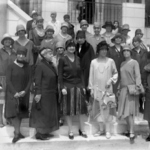Arbeitsbereiche Didaktik der Politischen Bildung, Sprachlehr- und -lernforschung sowie Geschichtsdidaktik und Zentrum für Lehrer*innenbildung der Univ. Wien, Demokratiezentrum Wien, Verband der Ö. Volkshochschulen und VHS Wiener Urania (Web)
Zeit: 15.-16.05.2025
Ort: VHS Wiener Urania
Einreichfrist: 04.12.2024
Ziel der Tagung ist es, das Verhältnis von Sprache, Demokratie und Bildung zu beleuchten. Es sollen theoretische, empirische und didaktische Perspektiven in Dialog gebracht werden. Abstracts können zu einer der folgenden – gerne aber auch weiteren – Fragestellungen eingereicht werden, gender-fokussierte Beiträge explizit erwünscht:
- Wie kann das Verhältnis von Sprache, Demokratie und Bildung analysiert werden?
- Welches Potenzial hat eine demokratische Bildung aus fachspezifischer und transdisziplinärer Perspektive?
- Unter welchen Bedingungen können Artikulationen von Demokratie in der Bildung hergestellt werden?
- Welche Rolle spiel(t)en sprachliche und politische Bildung, um eine Kultur der Demokratie zu fördern?
- Wie beeinfluss(t)en sich Sprache und subjektive Vorstellungen von Demokratie gegenseitig?
- Welche Formen von Inklusion und Exklusion durch Sprache gibt/gab es im Kontext demokratischer Bildung und welche Auswirkungen haben/hatten diese?
Organisator:innen: Johanna Taufner, Denis Weger, Eva Vetter, Dirk Lange, Thomas Hellmuth und Stefanie Fridrik
Weitere Informationen finden Sie auf der Website (Web)
Quelle: female-l@jku.at

 LOS – Lesbenorganisation Schweiz
LOS – Lesbenorganisation Schweiz  Sapienza Università di Roma, Italy; Daria Dyakonova and Minja Bujakovic (European University Institute – EUI, Florence)
Sapienza Università di Roma, Italy; Daria Dyakonova and Minja Bujakovic (European University Institute – EUI, Florence) 
 Katerina Dalacoura, Vaia V. Geragori, Maria Paitaki, Vasiliki Papadopoulou, and Kostas Tsampouras (Crete), Krassimira Daskalowa and Valentina Mitkova (Sofia), Giorgos Manios (Athens), and Ivana Pantelić (Belgrade)
Katerina Dalacoura, Vaia V. Geragori, Maria Paitaki, Vasiliki Papadopoulou, and Kostas Tsampouras (Crete), Krassimira Daskalowa and Valentina Mitkova (Sofia), Giorgos Manios (Athens), and Ivana Pantelić (Belgrade)  fernetzt. Verein zur Förderung junger Forschung zur Frauen- und Geschlechtergeschichte
fernetzt. Verein zur Förderung junger Forschung zur Frauen- und Geschlechtergeschichte  Hungarian Historical Review
Hungarian Historical Review  Organisation: Theresa Adamski, Natascha Bobrowsky, Johanna Gehmacher, Paula Lange und Michaela Neuwirth
Organisation: Theresa Adamski, Natascha Bobrowsky, Johanna Gehmacher, Paula Lange und Michaela Neuwirth Archiv der deutschen Frauenbewegung (AddF)
Archiv der deutschen Frauenbewegung (AddF)  i.d.a.-Dachverband: Verbundkatalog META
i.d.a.-Dachverband: Verbundkatalog META